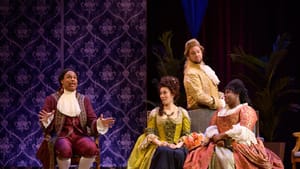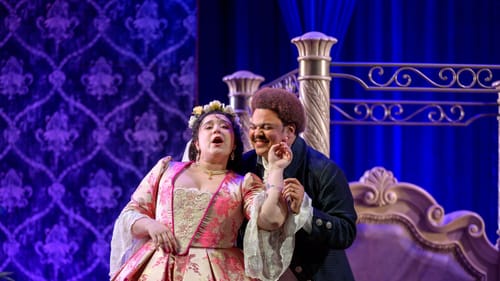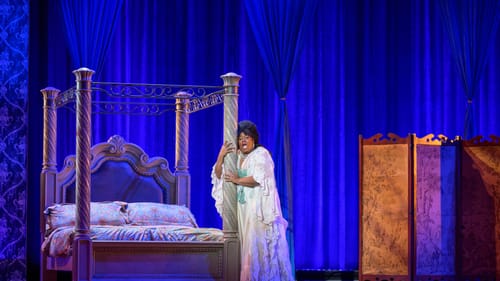Stay in the Loop
BSR publishes on a weekly schedule, with an email newsletter every Wednesday and Thursday morning. There’s no paywall, and subscribing is always free.
The genius of the Chevalier de Saint-Georges
Opera Philadelphia and Boston Lyric Opera present Joseph Bologne’s The Anonymous Lover

Winning music, inspired staging, meaty principal roles, and a sold-out house created the perfect theatrical evening on opening night of Opera Philadelphia’s The Anonymous Lover. Staged in the Academy of Music, this opéra comique is the only surviving complete opera (of six) by French composer Joseph Bologne. Though it premiered in Paris in 1780, it’s a still-relevant consideration of love and friendship given a faultless production that banished wintry weather and charmed its delighted audience.
The plot revolves around the dilemma of wealthy, generous young widow Léontine (soprano Symone Harcum), who for four years has received gifts and passionate declarations of love from the title admirer. Léontine has been advised throughout by her dear friend, musician, and composer Valcour (tenor Travon D. Walker). The clever ploy of this clockwork plot is that the audience knows from the start that the “anonymous lover” is Valcour himself, besotted with Léontine and unable to declare his affections lest he lose her as a friend and companion.
His latest gift is a bouquet, saying that if she carries these flowers to the wedding of villagers Jeanette (soprano Ashley Marie Robillard) and Colin (tenor Joshua Blue)—whose ceremony she is sponsoring—it signals that she accepts her lover’s affections. Considering whether she can love again, Léontine charmingly argues with her friend Dorothée (mezzo-soprano Sun-Ly Pierce), who (knowing the identity of the suitor) believes she should accept the amorous challenge. Meanwhile, Valcour has similar back-and-forth discussions with his witty friend Orphémon (baritone Johnathan McCullough), who continuously and comically urges the vacillating lover to stop dithering.
Charming, jaunty, and graceful
Presented here without intermission, The Anonymous Lover has an admirably clean structure upon which Bologne builds his charming two acts with a 20-member chorus (appearing once in each act) and six singers: the romantic leads and their best friend foils (all four nobles), along with the comic rustic characters.
The 90-minute work opens with a jaunty overture that aptly sets the tone (as does an ensuing entr’acte between Acts I and II). The orchestra features a harpsichord, a period underpinning the music, and also an onstage fixture “played” by Valcour. The admirably diverse company (onstage and off) featured multiple Opera Philadelphia debuts, including conductor Kalena Bovell. She led the musicians with grace and authority, adeptly achieving both the lightness of a period chamber orchestra and the heft required for an operatic ensemble.

All six principal singers were simply wonderful. Without exception, they sang with ample virtuosity and charm, balancing froth with the more serious considerations that bubble just below the surface of this seemingly light work. Bologne’s dramatic structure gives each singer a time to shine, and it’s impossible to single out any one of them, so equally strong was each aria, spoken scene, physical presence, or witty turn of phrase.
An inventive and satisfying staging
Throughout, the strong onstage company was buoyed by the inventive (and often very funny) staging of Dennis Whitehead Darling. Also in a company debut, Darling explored both the poised (and posed) conventions of the genre and the era, realizing them with an onstage fluidity that added to both the comic tone and the opera’s underlying romance.
This totally satisfying production was so appealing and approachable because it almost equally alternated spoken dialogue (in English) with sung arias and chorus sections (in French with supertitles). In fact, unexpectedly, spoken word opens the opera. Noted Boston playwright Kirsten Greenidge updated the dialogue, skillfully balancing contemporary speech with French farce traditions, an adaptation that gives each principal ample opportunities to display acting prowess.
The excellent chorus (under Elizabeth Braden) appears twice as villagers pour into Léontine’s salon and bed chamber, an incongruous fact wittily addressed in the script. The elegant setting (by Barron E. Pugh) perfectly melded the elan of 18th-century Paris with the contemporary sensibilities of Greenidge’s dialogue. Lighting (Driscoll Otto) also artistically dovetailed the rich hues of grand opera with the brighter lights of comedy.

Costumes (Leslie Travers) were redolent of an elegant society, with witty touches and a stunning Act II reversal for Léontine, when she changes her opulent costume for a floating peignoir that clearly indicates her romantic desires. Unlike many period productions, the company was totally at ease in both their clothing and their movement (choreography by Felicity Stiverson).
An extraordinary life
It’s hard to separate Bologne (1747-1799) from his origin story. His father was a white wealthy planter in French Guadeloupe, and his mother was an enslaved teenager in that household. Remarkably gifted, a Black man in an overwhelmingly white society working in an equally white musical world, he rose to undisputed prominence in the musical life and society of Paris. Violinist, theatrical director, composer, and impresario (he commissioned Haydn’s Paris Symphony), Bologne (aka the Chevalier de Saint-Georges) was also a champion fencer, noted dancer, decorated military man, and political thinker, and this opera incorporates his musical gifts, societal views, and what must have been considerable personal charm.
Rooting for the repertoire
On January 31, there was a well-attended, excellent pre-show lecture by Lily Kass, the company’s scholar-in-residence, and the evening got off to a roaring start when Opera Philadelphia general director Anthony Roth Costanzo, in spangly Eagles green, bounded onstage to the kind of whoops and cheers often reserved for sporting events. He announced that the company’s entire season was sold out, due to his bold marketing model of selling all seats for $11 (or pay-what-you-will). Indeed, almost all of the Academy’s 2,600 seats were full, and Costanzo further set the evening’s lively tone by saying that “the opera you’re about to see is like Bridgerton with better music!”
It's impossible to overstate the delight, artistry, and seamless panache of these singers and the entire Opera Philadelphia production, co-produced with Boston Lyric Opera. The only drawback is that due to the sell-out, I couldn’t return to see it a second time. Let’s hope The Anonymous Lover joins the repertoire and becomes a staple offering of this newly energized company.
What, When, Where
The Anonymous Lover. Music by Joseph Bologne; libretto by François-Georges Fouques Deshayes, based on the play L’amant anonyme by Stéphanie Félicité, and adapted by Kirsten Greenidge. Conducted by Kalena Bovell and directed by Dennis Whitehead Darling. Co-produced with Boston Lyric Opera in English and French (with English supertitles). January 31 and February 2, 2025, at the Academy of Music, 240 S Broad Street, Philadelphia. (215) 732-8400 or operaphila.org.
Accessibility
The Academy of Music has a wheelchair-accessible entrance on the building’s south side and has wheelchair seating locations and accessible restrooms. Some seats near the stage are reserved for guests with low vision or blindness. Service animals are welcome.
Sign up for our newsletter
All of the week's new articles, all in one place. Sign up for the free weekly BSR newsletters, and don't miss a conversation.

 Gail Obenreder
Gail Obenreder